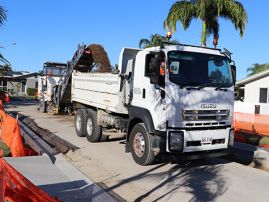What to do After an Event
Venturing outside or returning home after a disaster has occurred can be both physically and mentally challenging. Knowing what you can expect to see and deal with may help you adjust to the aftermath.
Things you can expect following an event include:
- Debris – and lots of it;
- Possible damage to your home and/or contents;
- Possible fallen power lines;
- Road closures;
- Emergency services and response groups working to assess and repair damage and provide assistance to the community (based on priority of greatest need);
- Possible loss of power and telecommunications;
- Limited or no access to essential services, local businesses and supplies;
- If you have evacuated, it may be some time before Emergency Services declare it safe for you to return home; and,
- Displaced animals.
What to do after an event
After an event, it is essential to ensure the safety of yourself and your family before commencing clean-up or trying to assist others. Here are some tips for keeping you and your family safe:
- Do not venture outside until you have heard the official word that the cyclone has passed. The calm may just be the eye or the cyclone may turn and hit your area a second time.
- Continue to listen for weather warnings and advice. The cyclone may redevelop or change direction threatening your area again. Flooding is also likely. Officials will issue public safety notices on such things as contaminated water supplies.
- Check to see if neighbours, especially those with special needs, require assistance. Help injured or trapped neighbours. This will help relieve the strain on emergency services, who will be stretched to the limit. If the situation is life threatening, call '000'.
- Be wary of fallen power lines and notify Ergon Energy. Treat all power lines as live and keep your distance.
- Look for fire hazards, mainly broken or leaking gas lines and gas cylinders.
- If there is a sewage overflow on your property, notify the council.
- Take pictures of the damage to your home for evidence in insurance claims.
- If the power has been out for some time, perishable food may have started to go off. Throw out any food that came into contact with floodwater.
- Do not drink or prepare food with tap water until authorities have advised supplies are safe.
- Use the telephone only for emergency calls. Arrange to have one family member or friend outside of the impacted area call others to let them know of your situation. Demands on the telephone network for emergency calls will be high and parts of the system may be damaged.
- Do not use electrical appliances which have been wet until they are checked for safety.
- If your home has become uninhabitable due to cyclone damage, contact your local Council to identify where you can seek further assistance.





